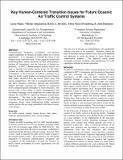| dc.description.abstract | Communication, navigation, surveillance, and decision
support capabilities in Oceanic air traffic control are evolving
significantly. It is important to consider the effect of the
changes on the controller’s task. In this paper the results from
multi-disciplinary studies performed at MIT (Massachusetts
Institute of Technology) and the University of Iceland are
presented. At MIT, a human-centered systems analysis was
used to identify key human factors issues for the future
Oceanic air traffic control environment to be experimentally
investigated. At the University of Iceland, a prototype for a
future air traffic control display was designed and evaluated.
Both studies identified three key human factors issues that
require consideration. The first is a mismatch between time
and space separation restrictions imposed and information
support provided, requiring the controller to cognitively
resolve temporal/spatial mismatches to meet restrictions. The
second issue is the effects of mixed communication and
surveillance equipage, which complicates the control task and
requires the controller to cognitively integrate asynchronous
information. The final is the importance of cultivating
controller trust and understanding issues of complacency and
automation disuse when implementing highly automated
conflict probes that are being considered in the future Oceanic
environments. | en |

